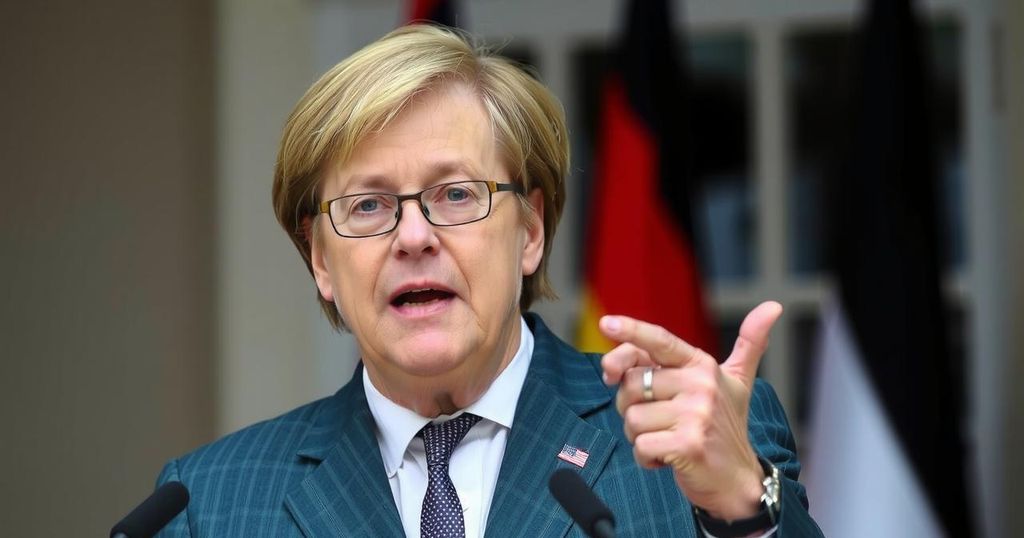German President Announces Early Elections Amidst Political Turmoil

German President Frank-Walter Steinmeier has dissolved parliament and scheduled early elections for February 23 after the collapse of Chancellor Olaf Scholz’s coalition. The political climate has intensified following a fatal attack, renewing debates on security and immigration. Major parties, including the CDU/CSU and SPD, are preparing for a campaign amid significant socio-economic challenges and differing approaches to key policies.
On Friday, German President Frank-Walter Steinmeier announced the dissolution of parliament and established February 23 as the date for early general elections, following the collapse of Chancellor Olaf Scholz’s coalition government last month. The coalition’s disintegration was rooted in internal discord over strategies for revitalizing Germany’s economy, compounded by a fatal car-ramming incident at a Christmas market that intensified the national dialogue surrounding security and immigration policies.
Emphasizing the importance of “political stability,” Steinmeier urged all participants in the upcoming election campaign to conduct themselves with “respect and decency.” The tragic event in Magdeburg resulted in five fatalities and over 200 injuries, leading Interior Minister Nancy Fraser to label the assailant, Taleb al-Abdulmohsen, as possessing “Islamophobic” views, although his precise motives remain elusive. In this context, Chancellor Scholz called upon the populace to unite against hatred and not allow it to dictate communal relations.
Current polling positions indicate the conservative CDU/CSU coalition, under Friedrich Merz, is leading with approximately 32 percent support, while the far-right Alternative for Germany (AfD) follows at 19 percent. In light of the recent attack, the AfD has argued for stricter immigration policies. President Steinmeier called for a fair and transparent electoral process, stressing that “hatred and violence must have no place in this election campaign.”
Chancellor Scholz’s Social Democrats remain at a significant disadvantage, polling at just 15 percent, following the collapse of their coalition due to longstanding internal disagreements. As a caretaker chancellor, Scholz will maintain his role until a new government is established, potentially prolonging the transition for several months post-election.
Amidst various challenges awaiting the next government—including economic instability, conflicts in the Middle East and Ukraine, immigration debates, and climate change—the need for substantial security measures is evident. Both the CDU and SPD share commitments to assisting Ukraine and enhancing defense expenditures. Furthermore, differing fiscal strategies arise, with the SPD proposing to mobilize 100 billion euros, contrasted by the CDU’s insistence on maintaining fiscal conservatism.
On climate and energy issues, the parties present conflicting plans regarding the transition away from fossil fuels and atomic energy, with the SPD advocating for renewables while the CDU reportedly considers restarting closed nuclear plants. This environment foreshadows a tense and complex electoral process, as Germany grapples with urgent societal concerns and a shifting political landscape.
The dissolution of the German parliament and the subsequent election announcement occur against a backdrop of political instability within Olaf Scholz’s government. Scholz’s coalition faced significant discord concerning economic recovery strategies, exacerbated by a tragic security incident that has reignited national discussions on immigration and public safety. President Steinmeier’s call for a respectful campaign underscores the gravity of the challenges that the incoming government will confront, particularly in areas impacted by socio-economic and geopolitical tensions.
In conclusion, the early elections in Germany, set for February 23, emerge from a complex interplay of internal government strife and urgent societal issues highlighted by a recent tragic event. The opportunities for political realignment are significant, with leading parties presenting divergent solutions to pressing challenges, including economic revival, security, and climate policies. As Germany approaches this pivotal moment, the electorate will be tasked with deciding the future direction of governance amid a backdrop of heightened tensions and unresolved debates.
Original Source: www.elpasoinc.com








